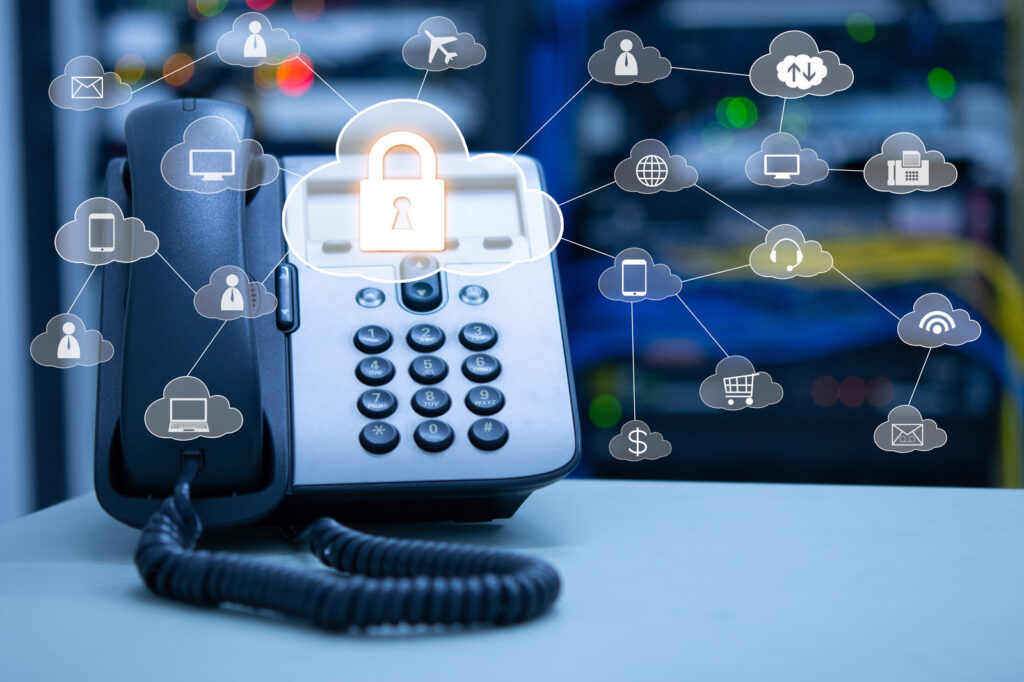If you’re considering a VoIP phone system for your hotel, you’re not alone. Many hospitality businesses are turning to VoIP to elevate their communications. It’s easy to see why – VoIP offers better flexibility, modern features that enhance the guest experience, and cost savings between 30% and 50% on average.1
However, like any technology that uses the internet, VoIP phone systems can introduce vulnerabilities that cyber criminals might try to exploit. The good news is that by following best practices and partnering with a secure VoIP provider, you can keep your business and guests safe from potential threats.
Read on to explore common VoIP security issues, best practices to secure your system, and tips on what to look for when choosing a secure VoIP provider for your hospitality business.
How Does a VoIP System Work?
Unlike traditional landline phones that rely on copper wires, VoIP (Voice over Internet Protocol) uses the Internet to route phone calls. Because VoIP systems eliminate the need for traditional phone lines, it’s easy to add or remove phone lines, set up smart call routing, and even integrate your phone system with other hotel management tools.
Here’s how VoIP calls work:
- Voice Signal Conversion: When you speak into an IP phone, your voice is transformed from an analog signal into digital data.
- Data Compression: Codecs (coder-decoders) compress the voice data to ensure your phone calls are smooth and high-quality, even if your internet connection isn’t the fastest.
- Packetization: Next, the system breaks this compressed data into packets, each of which contains a small portion of your conversation.
- Transmission: It then sends the data packets over the internet using various protocols to make sure they get to the right place.
- Reassembly and Conversion: Once the data packets reach their destination, the receiving system puts them back together in the right order and converts them back into an analog signal that the recipient can hear through their phone or device.
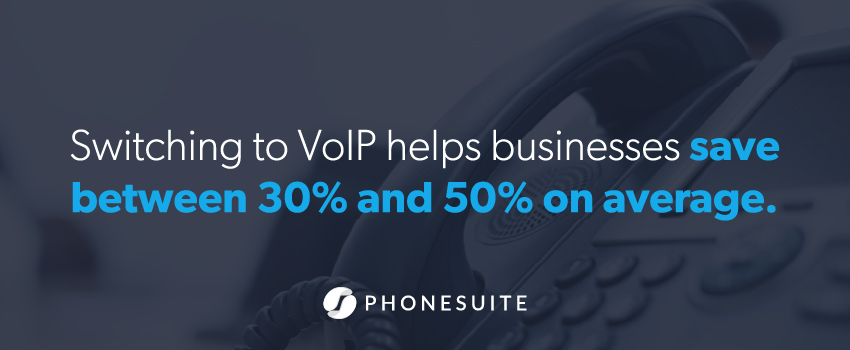
Is VoIP Secure?
Like almost any technology that connects to the internet, VoIP systems can be vulnerable to hacking and other security threats. The security of your VoIP system largely depends on two things: the overall IT security measures you have in place at your hotel and the security features provided by your VoIP service provider. With the right setup, VoIP can offer some pretty impressive security features that you won’t find with legacy phone systems.
The key to keeping your VoIP phone system secure is understanding where its potential weak spots are and taking steps to protect them. By partnering with a reputable VoIP provider and following best practices, you can enjoy all the benefits of VoIP technology while minimizing security risks.
Why Is VoIP Security Important?
A 2023 report found that 31% of hospitality businesses have experienced a data breach, with 89% of those affected more than once in a year.2 Think about all the sensitive information that flows through your phone lines: guests’ personal details, credit card information, and confidential business communications. If a cyber criminal manages to breach your phone system’s security, it could spell big trouble.
Falling victim to a breach can lead to financial repercussions, including potential legal headaches, fines for failing to follow data protection regulations, and the costs of mitigating the breach. And perhaps even more damaging is the potential loss of trust from guests and partners. Reputation is everything in the hospitality industry, so security breaches can lead to long-term damage to the brand you’ve worked so hard to build.
Prioritizing VoIP security isn’t just about protecting your data; it’s about safeguarding your hotel’s reputation, maintaining the trust of your guests, and ensuring your business continues to thrive in our increasingly digital world.
Common VoIP Security Risks
Understanding the specific security risks VoIP systems face is the first step in building a solid defense. Here are some of the most common VoIP security threats:
Packet Sniffing
Packet sniffing involves intercepting and analyzing data packets as they travel across the network. For hotels, this could mean attackers listening in on conversations or stealing sensitive data transmitted during calls.
To protect against packet sniffing, you’ll need to implement strong encryption protocols for all VoIP communications. Additionally, monitoring network traffic for unusual patterns can help you detect packet sniffing attempts before they can damage your VoIP network.
Denial of Service (DoS)
DoS attacks flood your system with so much internet traffic that it can’t handle legitimate calls. For a hotel, this can mean frustrated guests who can’t make or receive calls – and the last thing any hotelier wants is unhappy guests.
Mitigating DoS attacks requires a multi-layered approach, including setting up firewalls, using an intrusion detection system, and working with your internet service provider to filter out malicious traffic. It’s also smart to have alternative communication methods so you can quickly switch if your main VoIP system gets overwhelmed.
Malware and Ransomware
Malicious software can infect your VoIP devices or network infrastructure, potentially leading to data theft, system crashes, or even ransomware attacks where criminals demand payment to give you back control of your system.
Protecting your hotel from malware and ransomware requires consistently updating all your systems, using antivirus and anti-malware solutions, educating your staff on how to spot and avoid potential threats, and keeping secure backups of your critical data.
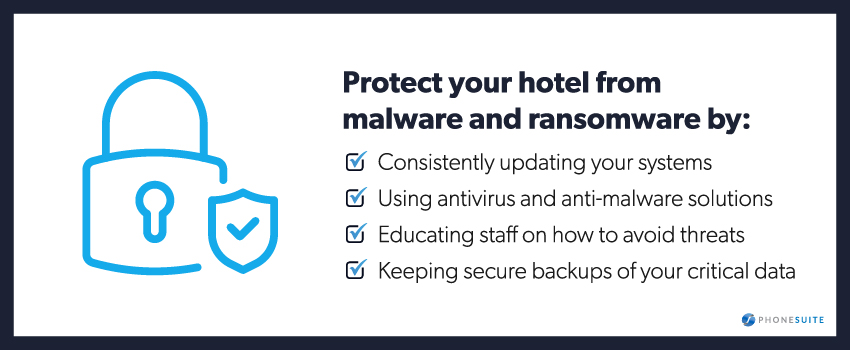
Vishing
Short for “voice phishing,” vishing involves criminals using social engineering tactics over the phone to trick your staff or guests into revealing sensitive information, like credit card details or login credentials. Vishing attacks can be particularly effective because people tend to trust voice communications.
Protecting against vishing requires a combination of tech solutions and staff training. Consider implementing caller ID verification systems and even voice biometrics for authentication. But most importantly, make sure your staff, especially those talking to guests, know how to spot a vishing attempt and what to do if they suspect one.
Spam over IP Telephony (SPIT)
Similar to email spam, SPIT involves sending unsolicited bulk messages over VoIP networks. While it might sound simply annoying, SPIT can disrupt your guests’ communications and potentially carry malicious content.
Combating SPIT requires a multi-layered approach. This might include implementing VoIP-specific spam filters, using systems that block known spam sources, and educating your staff and guests on how to recognize and report suspicious calls.
Toll Fraud
Toll fraud is when criminals hack into your VoIP system to make unauthorized calls, often to premium rate numbers, resulting in hefty charges for your hotel. Toll fraud can quickly rack up substantial costs, hitting your bottom line and potentially disrupting service if the fraudulent activity leads to your account being suspended by your VoIP service provider.
You can prevent toll fraud by setting up strict call control policies, which may include setting up call routing rules, restricting international or premium rate calls, and keeping an eye on call patterns for any unusual activity. You might also consider implementing real-time fraud detection systems that can automatically flag and block suspicious calling patterns.
VoIP Security Best Practices
Now that we’ve covered VoIP security risks, let’s explore the solutions. Here are some best practices to help you boost your VoIP system’s security:
1. Enforce a Strong Password Policy
Implement a robust password policy that requires complex passwords – think a mix of uppercase and lowercase letters, numbers, and special characters. Don’t forget to change these passwords regularly, and make sure to change default passwords on new devices immediately upon installation.
For an extra layer of security, consider implementing multi-factor authentication (MFA) to access your business phone system. VoIP users will need to provide two or more verification factors to gain access, making it much harder for unauthorized users to break in, even if they manage to steal a password.
2. Monitor Call Logs
Regularly monitoring your hotel’s call logs can help you spot any unusual activity that might signal a data breach. Look out for things like unexpected international calls, calls made at odd hours, or a sudden spike in call volume.
Consider using automated monitoring tools that can flag suspicious activity in real time, which can allow you to respond quickly to potential security threats. These tools also provide valuable insights into how your system is being used to help you optimize your VoIP setup for better performance and security.
3. Educate Your Staff
Your staff is your front line in the fight against threats. Provide them with comprehensive training on VoIP security that covers:
- How to recognize and report suspicious calls or phishing attempts
- The proper way to handle sensitive information over the phone
- The importance of keeping passwords secure
- Understanding and following the hotel’s policies for using VoIP phones
Security threats are always evolving, so regular refresher courses and updates on new security threats can help keep security at the forefront of your employees’ minds.
3. Avoid Public WiFi
Public WiFi networks are convenient, but they’re also notoriously insecure. Make sure your staff knows not to use the hotel’s VoIP system over public WiFi networks when they’re working remotely.
If remote access to the VoIP system is necessary, set up a secure Virtual Private Network (VPN) solution. A VPN creates an encrypted tunnel for data transmission to ensure your communications stay private and secure, even when using public internet connections.
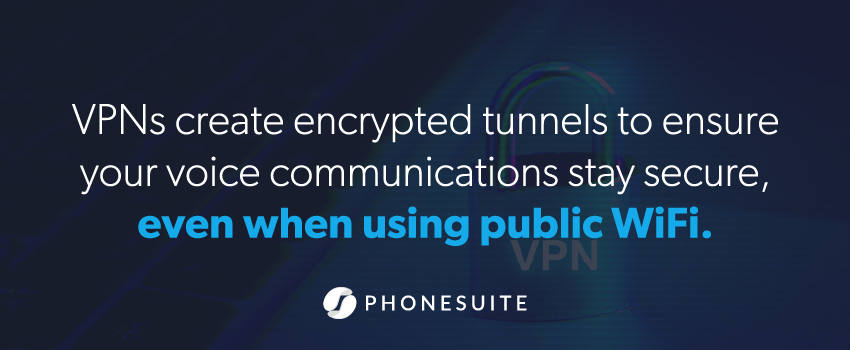
5. Deactivate Inactive Accounts
Unused or inactive accounts can be an easy way for attackers to sneak into your system. Regularly review user accounts and deactivate any that are no longer needed, such as accounts belonging to former employees or temporary staff.
Set up a formal process for managing accounts, including promptly deactivating accounts when an employee leaves. Regularly auditing active accounts can help ensure only current, authorized users have access to your VoIP system.
6. Secure BYOD and Mobile Devices
With more and more people using their own devices for work and the rise of mobile VoIP applications, implementing security measures for these devices is vital. Here’s what you can do:
- Require device registration and approval before allowing access to the VoIP system
- Implement mobile device management (MDM) solutions to enforce security policies
- Ensure all devices have up-to-date antivirus and anti-malware protection
- Educate your staff on how to use mobile devices securely for VoIP communications
Consider setting up a separate, secure WiFi network specifically for communications on mobile devices to help isolate and protect VoIP traffic.
7. Keep Software Up-to-Date
Regularly updating your VoIP system, including all software, firmware, and hardware components, is essential for maintaining security. These updates typically include patches for known vulnerabilities and improvements to security features.
Set up a regular schedule for checking and applying updates. If possible, automate this process to ensure you’re always running the latest, most secure versions. Make sure the updates don’t introduce any new issues or conflicts by testing them in a controlled environment before rolling them out across your entire system.
8. Conduct Regular Security Audits
Audits can help you identify security vulnerabilities in your VoIP phone system before they can be exploited. These audits should include:
- Reviewing access logs and user privileges
- Checking for outdated VoIP software or firmware
- Testing voice network security measures
- Assessing compliance with relevant data protection regulations
Consider bringing in third-party security experts to conduct periodic penetration testing. These controlled attempts to breach your system can reveal weaknesses that might not be obvious through regular audits.
How Can Hotels Choose a Secure VoIP Provider?
Selecting a VoIP provider with robust security measures can help your hotel stay protected and compliant with industry regulations. When you’re shopping around for VoIP providers, consider these factors:
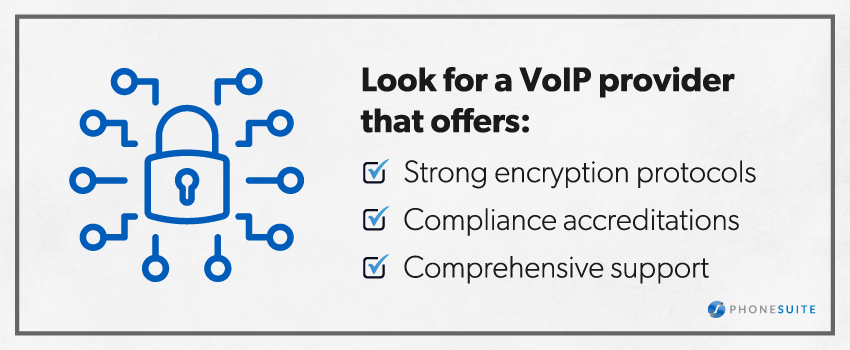
Encryption
Look for service providers that offer end-to-end encryption for all VoIP calls and data transmissions. This should include Transport Layer Security (TLS) for signaling, Secure Real-time Transport Protocol (SRTP) for voice data, and Virtual Private Network (VPN) support for remote access. Strong encryption is the foundation of a secure VoIP system, protecting your hotel’s communications from interception and eavesdropping.
Don’t be afraid to ask potential VoIP providers about the specific protocols they use and how often they update their encryption standards. A reputable provider should be happy to explain their VoIP encryption methods and how they protect against known vulnerabilities. Also, ask about their key management practices – proper handling of encryption keys is crucial for keeping your encrypted communications secure.
Accreditation
Make sure the provider complies with relevant industry standards and regulations.
This might include:
- Payment Card Industry Data Security Standard (PCI DSS) for handling credit card information
- Health Insurance Portability and Accountability Act (HIPAA) if your hotel offers health-related services
- General Data Protection Regulation (GDPR) for handling data of EU citizens
When you’re evaluating a provider’s compliance credentials, ask for proof. They should be able to provide documentation of their certifications and audits. A secure VoIP provider should also be open to sharing the results of regular third-party security assessments.
Support
Your service provider should offer comprehensive support, including 24/7 technical assistance, regular security updates and patches, proactive monitoring for potential threats, and help with security audits and compliance requirements. Responsive support is a must for maintaining the security of your VoIP system and avoiding communication breakdowns.
When you’re checking out a VoIP provider’s support offerings, ask about their response times. How quickly do they typically respond to different types of issues? What’s their game plan for handling critical security incidents? You’ll also want to know how they inform their clients about potential vulnerabilities and how fast they usually roll out patches for known security issues.
Elevate Your VoIP Security System With Phonesuite
Securing your VoIP phone system is essential for protecting your hotel, your guests, and your reputation in the competitive world of hospitality. By deploying robust security measures and teaming up with a VoIP service provider you can trust, you can enjoy everything this cutting-edge communication technology has to offer while minimizing risks.
That’s where Phonesuite comes in. We offer a secure, reliable phone system that’s built from the ground up for hospitality businesses. With over 30 years of serving the industry, we’ve seen it all when it comes to hotel communication needs and security challenges. That’s why we design true hospitality phone solutions with all the features and functionality you need to run a hotel – securely and efficiently.
Ready to take your hotel’s VoIP security to the next level? Reach out to Phonesuite today to learn more about how our secure hotel phone systems can protect your business and make your guests’ experience even better.
Sources:
